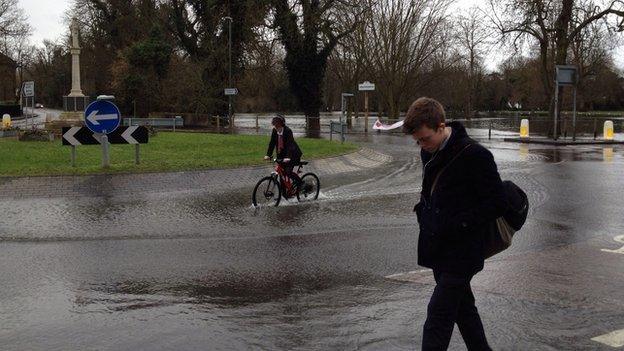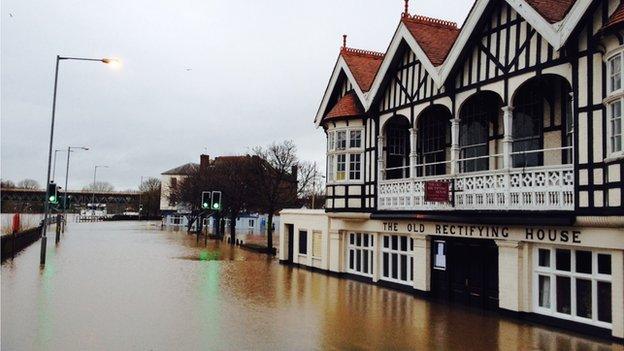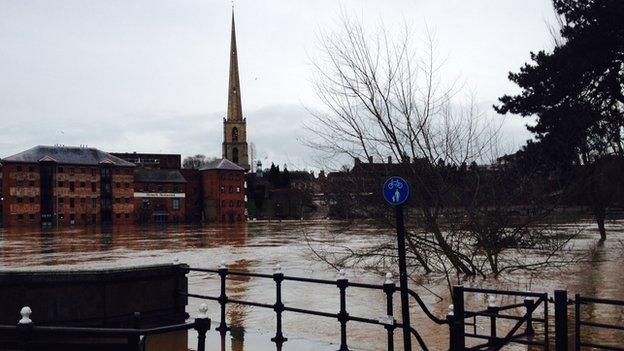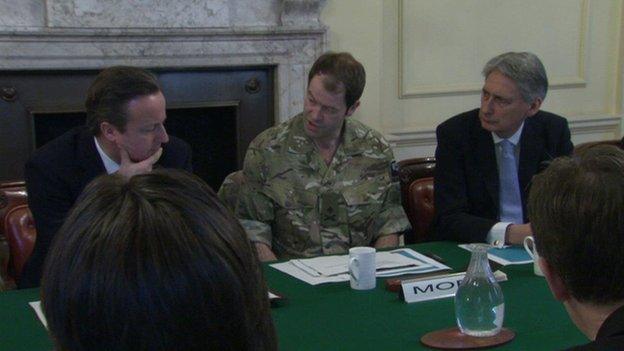UK floods: More flooding fears as storms forecast
- Published
Footage of the flooded Thames at Staines on Wednesday
Parts of the UK are again facing flooding as forecasters warn a further band of stormy weather later could mean the "strongest" winds of the winter.
The Met Office, external has issued a rare red warning for gusts of up to 100mph in west Wales and north-west England.
There are sixteen severe flood warnings , externalin Berkshire, Surrey and Somerset.
The transport secretary said the PM's pledge that money was "no object" in the relief effort did not amount to a "blank cheque" for tackling floods.
Troops pledged
The Met Office red warning, which means people should take action, is for between 13:30 GMT until 21:00 GMT and is the first issued this winter.
The Met Office said: "Winds of this strength can cause widespread structural damage, bringing down trees and also leading to loss of power supplies.
"In addition, large waves are likely to affect some coasts. The public should take action to alter their travel arrangements during this spell of storm force winds."

Swelling flood and ground water make several roads in Shepperton impassable by car

The Environment Agency is warning more homes could be flooded in Worcester

The agency says the River Severn is still rising but that new flood defences are saving 1,300 homes
Other updates include:
There are still major disruptions for several rail services, with passengers advised not to travel, external. There remain severe delays between Reading and London after water leaked into signalling and electronic devices on the line at Maidenhead
BBC forecasters say a month's worth of rainfall is expected to fall in parts of southern England over the next few days
The Environment Agency warns more homes will be flooded as rivers in Herefordshire and Worcestershire continue rising over the next few days
The Met Office has warned of Hurricane Force 12 winds in the sea areas of Lundy, Fastnet and Irish Sea and ferry services have been cancelled
Up to £60m not spent by the Department of Transport this year could be used to help repair the rail network battered by the recent storms
Ch Supt Matt Twist told the BBC there were "100 more homes evacuated overnight" in Surrey and there were "massive resources" on the ground including 250 soldiers and 30,000 sandbags had been distributed across the county. Several schools have been closed
A severe flood warning remains in force on the River Thames and levels will remain very high over the coming days. Water levels are currently higher than those experienced in 2003

David Cameron has chaired a meeting of the government's emergency Cobra committee on the flooding
Managing director of network operations at Network Rail, Robin Gisby, said it was going to be "another difficult day for commuters", and he described the landscape across southern England and the South West as an "inland sea".
He said the high winds forecast meant that trains would be running at reduced speeds in Cornwall, Devon, parts of Wales, and in the Preston area of Lancashire.
On Tuesday PM David Cameron said that money was "no object" for the flood relief effort, but Transport Secretary Patrick McLoughlin told ITV's Daybreak: "I don't think it's a blank cheque.
"I think what the prime minister was making very clear is that we are going to use every resource of the government and money is not the issue while we are in this relief job, in the first instance, of trying to bring relief to those communities that are affected."
And he told BBC Radio 4's Today programme the government would have to prepare itself for more frequent extreme weather events in the future.
He said: "I don't think we can take this as a one off event. There is more extreme weather, and it's about how you become resilient."
Meanwhile, the prime minister has chaired a meeting of Cobra in Downing Street and was told that thousands of military personnel were available at short notice to give extra support.
BBC News Channel chief political correspondent Norman Smith said Chancellor George Osborne was among those at the meeting even though he does not normally attend "to rein in any of his colleagues who suddenly thought that the coffers were open and they could help themselves".
Environment Agency chief executive Paul Leinster told the committee that water levels could rise to "higher than current levels" over the coming weekend.
He said: "Oxford to Maidenhead we think could rise over the next five days and may lead to more flooding in that area.
"Below Maidenhead, the levels are holding at the current level but potentially over the weekend and going into the beginning of next week they could rise to higher than the current levels."
The BBC's Ben Geoghegan, in Wraysbury, Berkshire, overnight, said the local primary school had been turned into "24/7 control centre" for residents affected by flooding.
Lucy Foster, who has been helping to run the operation, said the village had been "looking after itself for a long, long time and morale was getting very low, energy levels were getting low".
"Finally we've got the boys and girls that we need - we've got the Army, the police force, the fire service and getting a lot of support from them and a lot of direction from them, which is what was needed."
Forecast from BBC Weather's Carol Kirkwood
Our correspondent said that, with so many homes in the village evacuated, there was a real fear some of the empty properties might be looted so the Army had set up checkpoints on some roads to monitor overnight who comes and who goes.
'Unprecedented' flooding
More than 1,000 homes have been evacuated along the Thames after towns and villages including Wraysbury, Chertsey and Datchet were flooded.
In Datchet, more than 1,700 properties were hit by a power cut on Tuesday evening. Scottish and Southern Energy said power had been restored to all residents by 00:30 GMT although a separate problem meant about 25 properties had temporarily lost power in the early hours.
Chief Supt Matt Twist, of Surrey Police, said the flooding in the county was "unprecedented" and warned that a further 2,500 homes were at risk.
An 85-year-old resident forced to leave her bungalow in one Surrey village spent the night at an evacuation centre.
She told BBC Radio 4's Today programme it was a "terrible experience". "I want to go, I want to get out of it [community evacuation centre] really, because you can't live like this, can you?
Floods victim evacuated to Thorpe Park
"I know everybody's in the same boat but I can't go back home."
Further evacuations have been taking place in the Staines and Egham area. Almost 6,000 properties have been flooded altogether in the past two months.
About 100 properties remain flooded on the Somerset Levels, where extra pumps are being brought in from the Netherlands, and groundwater flooding is also expected in the coming days in Hampshire, Kent and parts of London.
As well as 16 severe flood warnings, the Environment Agency has also issued about 350 less serious flood warnings and alerts, external, mostly in southern England and the Midlands.
The agency said it looked "increasingly likely" there would be problems along the River Severn and River Wye.
And it said groundwater levels were so high in some parts of the country that flooding was likely to persist for weeks or even months flooding was likely to persist for weeks or even months.